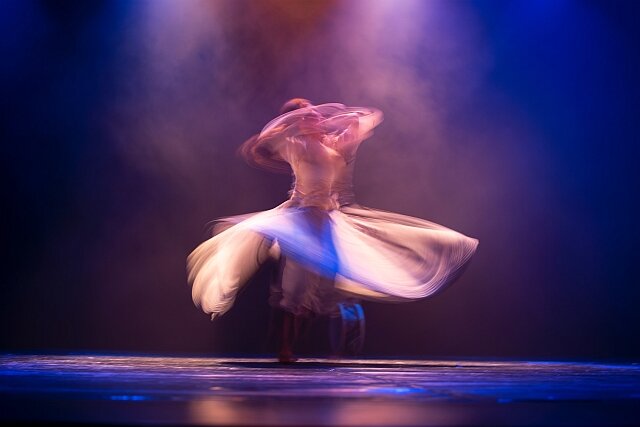Standing or dancing out of joy for the Prophet, or for what is connected to him or proceeds from him, has clear proofs in the Sunna. Among them:
- The Ethiopians put on a dancing display with spears out of joy (farahan) when he came to Madina. Abu Dawud narrated it with a good chain in the book of Adab in his Sunan from Anas.
- They played again in the Prophet’s Mosque on the day of `Eid al-Fitr, whereupon they danced while the Prophet and his wife looked on, and the Prophet encouraged them with the words dunakum ya bani arfada, “Jump to it, O sons of Arfada!” thus indicating that what they were doing was harmless and permissible. Muslim narrated it in the book of Salat al-`idayn in his Sahih from `A’isha.
- Similarly, they would bang the drum, sing, and play in front of him on the day of `Eid. Ahmad and Ibn Majah narrated it from Qays ibn Sa`d ibn `Ubada.
All this was not for any other reason than joy at being around the Prophet, as confirmed by the act of the women of the Banu Najjar when the Prophet came to Madina:
- Anas narrates that when the Prophet first came to Madina the Ansar came out, men and women, and they were all saying: “With us, O messenger of Allah!” [i.e. come stay with us.] The Prophet said: “Let the camel choose, for she has her orders.” The camel alighted at the door of Abu Ayyub. Anas continued: (After he went in) the women of Banu al-Najjar came out banging their drums and singing:
Nahnu jawar min bani al-najjar
ya habbadha muhammadin min jar
We are the girls of the Sons of Najjar
O delight of Muhammad for a neighbor!
The Prophet (s) came out and said: “Do you love me?” (atuhibbuni?) They replied:
Ey wallah Ya Rasulallah
Yea, by Allah, O Messenger of Allah!
At this he said:
Wa ana uhibbukum
Wa ana uhibbukum
Wa ana uhibbukum
And I love you.
And in another version he said:
Allahu ya`lamu anna qalbi yuhibbukunna
or
Allahu ya`lamu anni la uhibbukunna
i.e.
Allah knows that my heart loves you /
that in truth I love you.
It is narrated by Bayhaqi with two chains in Dala’il al-nubuwwa (2:508), Ibn Kathir in al-Bidaya wa al-Nihaya (3:199-200), and Suyuti in al-Khasa’is al-kubra (1:190). Shaykh Muhammad ibn `Alawi al-Maliki in al-Bayan wa al-ta`ri fi dhikra al-mawlid al-sharif (p. 24-25) said that al-Hakim documents it, Abu Sa`d al-Nisaburi mentions it in his Sharaf al-mustafa, and Ibn Majah narrates it in his Sunan, book of Nikah (#1889).
- Several female Companions came up to the Prophet after he came back from his campaigns and said that they had vowed to bang the drum before him if he came back safe and sound, and the Prophet allowed them. This is narrated by Tirmidhi from Burayda and he said: hasan sahih gharib, also Abu Dawud, and elsewhere.
- `Ali said: I visited the Prophet with Ja`far (ibn Abi Talib) and Zayd (ibn Haritha). The Prophet said to Zayd: “You are my freedman” (anta mawlay), whereupon Zayd began to hop on one leg around the prophet (hajala). The Prophet then said to Ja`far: “You resemble me in my creation and my manners” (anta ashbahta khalqi wa khuluqi), whereupon Ja`far began to hop behind Zayd. The Prophet then said to me: “You are part of me and I am part of you” (anta minni wa ana minka) whereupon I began to hop behind Ja`far. Imam Ahmad related it in his Musnad (1:108) and Ahmad Muhammad Shakir declared it sound (sahih) in his Riyadh, 1949 edition; it is related also by `Uqayli, Abu Nu`aym from Jabir, and Ibn Sa`d in his Tabaqat with a sound chain to Muhammad al-Baqir.
There is no doubt that such singing, dancing, reciting of poetry, and banging the drum was for joy at being with the Prophet, nor did he condemn or frown upon such displays in any way whatsoever. These are common displays of happiness and lawful merriment, and similarly to stand up at the mention of the Prophet’s birth is an ordinary act that shows love and gladness symbolizing the joy of creation: it does not constitute worship, nor law, nor Sunna!



